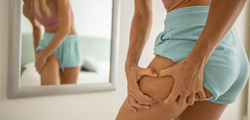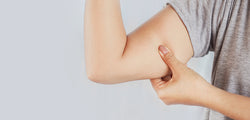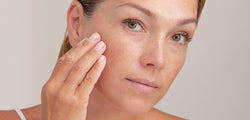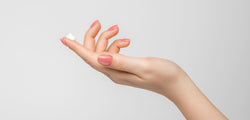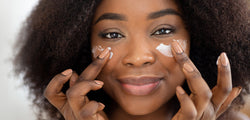
Retinol Under Eyes - Debunking the Myths and Misconceptions
Table of Contents:
Retinol is arguably the biggest superstar in the skincare game. Not only is it lauded as being one of the most effective pimple-fighting ingredients but it is also highly regarded as an effective anti-aging weapon that works tirelessly to keep wrinkles and fine lines at bay. Having said that, it is not hard to notice that there is a new culture that has been recently cropping up; that of applying retinol under eyes and the surrounding area. But how exactly effective is this? And most importantly, is it even safe or recommended to apply retinol around eyes?
Here's a detailed overview on that and more.
Is Retinol Safe For Under Eyes?

First, it is imperative to point out that retinol is a derivative of vitamin A that is believed to be potent enough to improve one's skin texture, tone and pigmentation. In fact, just a few drops of a well-formulated retinol serum has more transformative and mind-blowing effects on your skin than a month's worth of application of a conventional cream. Still, it is natural to ponder over questions like, "is retinol safe for under eyes?" or "can you use retinol under eyes?"
It is understandable to have your concerns and doubts regarding the safety of retinol use around the eyes, especially with the numerous unsubstantiated rumors floating around this vitamin A complex. Well, even before getting to the crux of the suitability or safety of retinol, it's critical to point out a few things.
For starters, retinol in its most basic form is simply a type of retinoid. As such, it has a unique mode of action that sets it apart from the crowd. You see, unlike other skincare ingredients and acne products such as salicylic acid or alpha-hydroxy acids, retinol does not just exfoliate and remove dead skin cells from the epidermis. Instead, it seeps deep into the underlying layers of the dermis and works to neutralize free radicals. This way, it somehow boosts the production and function of collagen and elastin. Which, as you would expect, culminates in a 'plumping' effect that improves the appearance of enlarged pores, wrinkles and fine lines.
Secondly, retinol has been shown to be beneficial in minimizing scarring, blemishes and formation of comedones. Now, as much as the results can take weeks to show up, they tend to stick around longer than when you're relying on other acne treatment products.
Lastly, studies show that apart from balancing your skin's hydration and moisturization levels, retinol also prevents excessive moisture loss thanks to its mild but dependable exfoliating effects. Speaking of which, this can also be beneficial in controlling overproduction of sebum in people with naturally oily skin.
Now, with that out of the way, it's vital to establish that retinol is essentially used in the treatment or cosmetic correction of the following dermatological defects
- Wrinkles
- Fine lines
- Acne
- Age spots, sun damage, photoaging, freckles et cetera
- Melasma
- Large pores as a result of oily skin, acne, or collagen loss
So, is retinol safe for under eyes? Definitely. Contrary to the common misconception that retinol burns under eyes, the vitamin A derivative is perfectly safe to use around your peepers as long as you adhere closely to the manufacturer's usage instructions.
What Does Retinol Do For Eyes?
Now that we have established that retinol is not only safe but also recommended for use around your peepers, one cannot help but wonder what does retinol do for eyes? Well, the gold standard in the skincare industry packs a few unique benefits tailored just for the skin around your eyes. Here's a quick primer on that.
1. It Fades Wrinkles and Fine Line Under the Eyes

According to dermatologists, the skin around your peepers is approximately four times as thin as that in other parts of the face and neck. In short, it is more susceptible and prone to fine lines and wrinkles that are hard to target and combat with conventional anti-aging lotions that employ run-of-the-mill ingredients. A retinol-based cream, such as Maryann's Moisturizing Cream with Hyaluronic Acid, provides a much-needed upgrade courtesy of its unmatched ability to address a number of factors. And it's pretty easy to see why.
For one, retinol stops or at least slows down the progressive breakdown of collagen with age or exposure to environmental aggressors such as pollution, UV rays and smoking. As such, it helps preserve the integrity of ultra-thin around your peepers ensuring that wrinkles and fine lines do not crop up as easily.
Secondly, we have already corroborated that retinol can stimulate the production of elastin and collagen molecules in the underlying layers of the dermis. But its potential to support and boost cell turnover that really plays a role in targeting fine lines around the eye area. Increased cell turnover, in case you didn't know, often translates to a greater degree of natural exfoliation which culminates in smoother, more supple, and firmer skin.
2. It Helps with Dark Circles
Of all possible eye concerns that signify the transition into middle age and the waning of youth, dark circles are probably the hardest to address. Unlike hyperpigmentation and blemishes on other parts of the face, dark circles are most always accompanied by loss of collagen and fat around this area which, mind you, already has the thinnest skin found anywhere in the body. And this explains the sunken eyes and gaunt look that these unsightly dark circles are known for, including the pronounced veins that demand 24/7 use of a concealer.
Fortunately, using retinol under eyes appears to solve these and many more of such related issues, thanks to its collagen-boosting capabilities. The 'plumping up of the skin' effect that retinol is able to impart to the thin skin under eyelids can be instrumental in correcting the damage metted by lack of enough sleep, sun exposure and pollution. What's even better, since retinol is known for supporting exfoliation and cell turnover, it can make the area around the lower eyelid appear a bit even and smoother, which reduces the conspicuousness of dark circles.
3. It Can Deal with Puffy Eyes but Patience is Key

Unlike ordinary eye creams that over-promise and make big claims but typically under-deliver, retinol-based alternatives have proven time and again to be better at dealing with the menace of puffy eyes. Granted, the results won't come overnight and neither are they in any way instantaneous. Nevertheless, with at least three months of continuous and regular use, you should be able to see some semblance of the puffy-eye look fading away and being replaced by a youthful complexion.
What's more, compared to other dermatological ingredients, the long-term prospects of retinol for dark circles under eyes are more promising and longer-lasting. Often, well-formulated retinol creams will also contain moisturising agents such as hyaluronic acid, something that instills an instant plumping and smoothing effect on the skin just under your peepers. While this may wear off by the next day, it's an excellent way of masking the 'tired and fatigued look' in the days when getting the recommended 8-hours-a-night proves to be a herculean challenge.
4. It Can Address Under Eye Skin Problems for a Majority of People
Because of retinol's unparalleled ability to influence almost all aspects of how the largest organ in the body functions, it's suitable for use by a large section of the demographic. Expectant women and those who are breastfeeding should avoid using it, though. That aside, anyone who is looking to prevent premature ageing around the eyes can benefit from a comprehensive retinol puffy eyes regimen.
Besides, bear in mind that the cells that play a crucial role in skin structure and collagen production, also known as fibroblasts, start to deteriorate progressively from our mid 20s and beyond. Therefore, implementing a retinol-based skin care regimen ought to be a worthwhile investment even if you have puffy eyes and dark circles (yet).
5. Retinol for Dark Circles Under Eyes Can Be Adjusted to Your Tolerance Level

Like anything else in life, retinol under eyes tends to work better for some people than others. And as a potent and somewhat aggressive skincare ingredient, it often at times gets a bad rap for over-the-top temporary side effects that may include extreme dryness and peeling. That's why it's imperative to choose the right retinol-based cream to use under your eyes, bearing in mind that the skin around your peepers can be very sensitive to new products.
A good way of kickstarting your product selection is by going for low-strength retinol eye creams, especially if you have never used retinoids before. This allows your epidermis to build up tolerance to this ingredient gradually over months or even years, depending on your skin type. In addition to this, prioritize retinol creams that are pre-mixed with a moisturizing and hydrating base like hyaluronic acid to provide some kind of a buffer between the powerful vitamin-A derivative and your skin.
Retinol And Sun

It is almost impossible to talk about this vitamin A derivative that has made a name for itself in skincare circles without mentioning the legendary retinol sun sensitivity myth. It's almost as if for all the good that retinol does for our skin, it has a few pitfalls that seem to haunt it everywhere it goes. Still, it's an irrefutable fact that retinol and sun exposure are like water and oil - they simply do not mix. Infact, the general rule as far as daily retinol use is concerned is that you should strive to stay away from direct sunlight to avoid hampering its efficacy.
The reason is simple; the vitamin A derivative tends to break down and decompose when exposed to the strong UV rays from the sun. It's actually the reason retinol creams are packaged in opaque jars and tubes. This implies that applying retinol then heading out into the blazing summer sun is useless and a waste of the cream. What's more, retinol sun exposure is also believed to make your precious skin a little more prone to sun spots, particularly when you also forget to wear sunscreen with a decent SPF. Which, of course, brings us to the question, how can you use retinol under eyes this summer?
The trick here is knowing how and when to use a retinol cream to banish dark circles and puffy eyes this summer. And this include;
- Apply it at dusk before bed: Let's face it, it's virtually impossible to avoid the sun's rays when it is blazing hot at the height of summer. Chances are, you will be tempted to leave the cool of your shade to feel the glorious warmth of the sun's majestic rays at some point during the day. The safest bet is to just refrain from applying the cream during the day.
- Go heavy on sunscreen the following day: After applying and swathing retinol under your eyes before bed, it's advisable not to skimp on the SPF the next day. Not only is it a good skincare habit overall but it also tones down the photosensitivity that may be left from the previous night.
Having said that, it is interesting to know that the summer is ironically the best time to use retinol under eyes, especially if you are among those that battle winter skin issues. Unlike during other seasons, your skin is naturally less dry in the summer. Consequently, this implies that it would be less prone to the possible side effects and sensitivity problems that could be induced by retinol. Secondly, the extra humidity in the summer makes torelating retinol-based creams easier for those who are just starting to use this amazing skincare product.
In Closing
Using retinol under eyes is a practical, efficient and recommended anti-aging approach to combat the various skin problems that plague the area around your peepers. And while it is not entirely without its own set of risks or side effects, the benefits that you stand to gain significantly overshadow the minimal inconveniences that you have to put up with. If anything, using a retinol-based eye cream is something that anyone over 25 ought to include in their daily skincare routine, whether they have dark circles or not.

